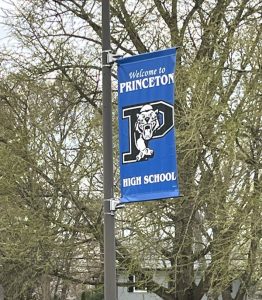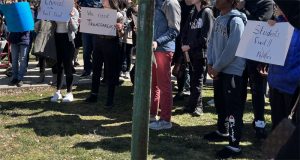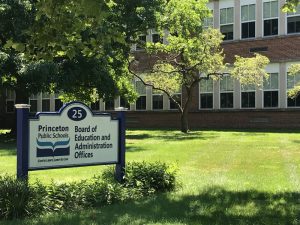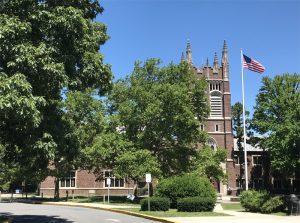 With time to absorb the fallout from Frank Chmiel’s resignation, students at Princeton High School are processing the changes in different ways.
With time to absorb the fallout from Frank Chmiel’s resignation, students at Princeton High School are processing the changes in different ways.
Some students are still loyal to their former principal, evidenced by the peaceful protest held outside of the school on March 20th. Using slogans such as “Chmiel is the Real Deal,” many high schoolers and their parents voiced concerns regarding the end of his time as principal. A GoFundMe has raised over $19,000 for Chmiel’s legal defense fund, and the numbers continue to climb.
Chmiel started at Princeton High School at the same time as the current sophomores, creating a connection of discovery and new experiences between the grade and him. For juniors and seniors, Chmiel’s enthusiasm for school spirit brought elaborate pep rallies – that quite literally brought the bleachers down. For freshmen, Chmiel was the only high school principal they knew. Thus, weeks later, some students are still upset over the sudden change in leadership. Many have expressed genuine distress, with Jane Sajan saying that she “feel[s] terribly hurt,” because Chmiel was “a great principal” who was “always helpful.”
It is clear that passions regarding this topic are intense, as shown by the loud boos and cheers at the Board of Education meeting in Princeton Middle School on March 28th and the yard signs that have appeared across Princeton.
However, the real outrage among the school community is the lack of transparency surrounding decisions made by the Board and the superintendent, Carol Kelley. All of the students interviewed at Princeton High School expressed the need for greater direct communication with high-school students, instead of indirectly through parents or teachers. Trevor Yu said that he learned about Chmiel no longer being principal through Discord, a popular messaging app, while Keitaku Iwata said that he heard from a friend.
 Blake Bergman attended the protest on March 20th because he “wanted to know the details” that school administration is “not telling” students. However, the school board and the Superintendent are legally limited by New Jersey’s laws regarding public employees. When asked about the change in leadership, Lena Hamilton says that she doesn’t “have enough information to have an opinion.” She believes that it is good for the school board to “adhere to legal” stipulations but should “provide information when possible.”
Blake Bergman attended the protest on March 20th because he “wanted to know the details” that school administration is “not telling” students. However, the school board and the Superintendent are legally limited by New Jersey’s laws regarding public employees. When asked about the change in leadership, Lena Hamilton says that she doesn’t “have enough information to have an opinion.” She believes that it is good for the school board to “adhere to legal” stipulations but should “provide information when possible.”
This issue was brought up at the Student Forum on March 23rd, which was hosted by the three vice principals, two of which – Ms. Birge and Mr. Johnson – were named the acting principals on March 17th. In an email to students and guardians on March 26th they wrote:
During our Student Forum last week, we received constructive criticism that our communication with students was overly “dry.” We value this feedback greatly. We are short-staffed these days. Just like our students, we, too, play catch-up sometimes – frankly, more often than we’d like to admit. We will definitely try our best and get the most critical and relevant information out daily. We recognize that the feedback extends beyond providing information on a daily basis. Instead, it emphasizes the importance of transparent and easily accessible communication…preferably all in one place. As soon as Dr. Kathie Foster comes on board, we will collaborate and begin to work on it. As we move forward, please know we will continue to make ourselves available to all students.
For high schoolers, “dry” communication means that elaboration and details are missing. One of the reasons why Chmiel was beloved was because of his “Chmiel Spiel,” a daily morning announcement sent through Canvas, which included typical school messages – like the lunch menu, the bell schedule, sports achievements, and special events or drives – but also an encouraging GIF or positive message. In an effort to replicate this success, or maintain some degree of normalcy, daily announcements containing the bell schedule were released for the first two days of the interim period, but that quickly fizzled out. These messages lacked many essential components of the Chmiel Spiel, which only further reminded students of how much has changed.
 Despite the cries for greater transparency, many students do not attend school board meetings or did not attend the student forum. Hamilton says that she feels no urgency to because she “can read about it later or ask [her] parents.” For Princeton Public Schools, school board meetings have become a meme for high school students, entirely reducing their effectiveness. The YouTube account @lolphs, which is very popular among Princeton high schoolers, condenses hours of footage into a compilation that mocks Board of Education members, the superintendent, and public commenters. For many high school students – who juggle athletics, academics, and other activities – spending hours to attend these meetings is not feasible.
Despite the cries for greater transparency, many students do not attend school board meetings or did not attend the student forum. Hamilton says that she feels no urgency to because she “can read about it later or ask [her] parents.” For Princeton Public Schools, school board meetings have become a meme for high school students, entirely reducing their effectiveness. The YouTube account @lolphs, which is very popular among Princeton high schoolers, condenses hours of footage into a compilation that mocks Board of Education members, the superintendent, and public commenters. For many high school students – who juggle athletics, academics, and other activities – spending hours to attend these meetings is not feasible.
Thus, the lack of reliable information being provided has spiraled into rumors attacking both sides of the issue. In a statement from Chmiel’s lawyer, it was revealed that “[t]here are no criminal allegations involved,” despite many assuming that was the case. The most common strike to the Board of Education and the superintendent is that they are bringing politics into education, accusing them of attempting to fire Chmiel because of an “agenda.” Now, the Princeton Parents for Black Children group have publicly offered their support to Carol Kelley, citing the attacks to the Superintendent from “anti-equity parents,” as their statement says. They deny that the “decline in students’ mental health” is “attributable to actions by the Superintendent,” likely referring to the idea that “constant administrative turnover is detrimental to student learning and mental health,” expressed by Mattias Blix at the March 28th Board of Education Meeting.
 In his short time as Principal, it is clear that Frank Chmiel has impacted the school community in many ways. However, the controversies this situation have evolved into exposes greater issues with the school district and reflect nationwide problems. The misinformation spreading in schools and with parents is absolutely detrimental to the health of the school system. Most of the students interviewed said that they did not believe there was a way for school leaders to prevent rumors from proliferating in their buildings, but greater student attendance and involvement in school board meetings appears to be a solution to this problem. Without active efforts to seek and communicate reliable information – from school administrators to students and parents – debates surrounding education may become more polarized and vicious.
In his short time as Principal, it is clear that Frank Chmiel has impacted the school community in many ways. However, the controversies this situation have evolved into exposes greater issues with the school district and reflect nationwide problems. The misinformation spreading in schools and with parents is absolutely detrimental to the health of the school system. Most of the students interviewed said that they did not believe there was a way for school leaders to prevent rumors from proliferating in their buildings, but greater student attendance and involvement in school board meetings appears to be a solution to this problem. Without active efforts to seek and communicate reliable information – from school administrators to students and parents – debates surrounding education may become more polarized and vicious.

Bhavya Yaddanapudi is in her second year at Princeton High School. As a member of the Princeton Youth Advisory Committee, she helps to advise the mayor and council on all issues related to teens and children. At PHS, she is on the Track & Field team and an active member of the Research Program.
